Picture this: You walk into a massive ballroom at the Georgia World Congress Center, clutching your stack of business cards. The room buzzes with hundreds of conversations, and you freeze. Who should you talk to? Is this even the right place for your business?
If that sounds familiar, you're not alone. Atlanta's business scene is thriving, but finding the right networking group can feel like searching for your car in a Braves game parking lot. You know it's out there somewhere, but where do you even begin?
Here's the good news: Atlanta has incredible networking opportunities for every type of business owner. Whether you run a boutique marketing firm in Virginia-Highland or manage a growing nonprofit in Decatur, there's a group where you'll feel at home. The trick is knowing which ones are worth your time.
This guide will walk you through Atlanta's best networking groups, from formal referral organizations to casual happy hours. You'll learn what makes each group unique, who thrives there, and how to spot the ones that match your goals.
Let's find where you belong in Atlanta's business community.
Why the Right Networking Group Matters More Than Ever
The Atlanta Business Landscape
Something shifted in Atlanta's networking scene after 2020. The days of collecting 50 business cards at generic mixer events are gone. Today's Atlanta professionals want meaningful connections, not just LinkedIn requests.
The city's business community has embraced a quality-over-quantity approach. People show up to events with specific goals and genuine interest in building relationships. Hybrid events have become the norm, letting busy professionals connect without always battling I-285 traffic.
This shift benefits everyone. When networking groups focus on real connections instead of superficial exchanges, members see better results. Referrals become more qualified. Partnerships develop naturally. Business actually gets done.
What Makes a Great Networking Group
The best networking groups in Atlanta share several qualities:
- Consistent Members Who Show Up Regularly: There's nothing worse than attending a group where the faces change every week. You need time to build trust and understanding with other members.
- Clear Structure and Expectations: Whether it's a formal agenda or a casual format, you should know what you're walking into. The membership should include diverse but relevant industries – enough variety to expand your network, but focused enough that conversations make sense.
- A Focus on Action: Members of great groups don't just exchange pleasantries; they actively look for ways to help each other succeed. They follow through on introductions and referrals. They celebrate wins together and problem-solve challenges.
Signs You're in the Wrong Group
Sometimes you need to cut your losses and find a better fit. Here are four signs you’re in the wrong group:
- Nonstop Sales Pitches: If every meeting feels like a sales pitch, that's a red flag. Good networking involves give and take, not just take.
- No Follow-Through: Pay attention to follow-through rates. Do people actually connect after events, or do those coffee meeting promises evaporate? If you're collecting cards but never hearing from anyone, the group might attract the wrong crowd.
- Misaligned Industry Mix: A financial advisor might struggle in a group full of artists and musicians. While diversity helps, you need some alignment with your target market or referral sources.
- Off Energy or Vibe: Trust your gut – if the energy feels off or forced, keep looking for your tribe.
General Business Networking Groups
Atlanta Business Network (ABN)
The Atlanta Business Network stands out as one of the city's most established referral groups. They meet weekly at various locations around metro Atlanta, with chapters in Buckhead, Sandy Springs, and Marietta. Each meeting follows a structured format: members get 30 seconds to introduce themselves, one member gives a 10-minute presentation, and then referrals flow.
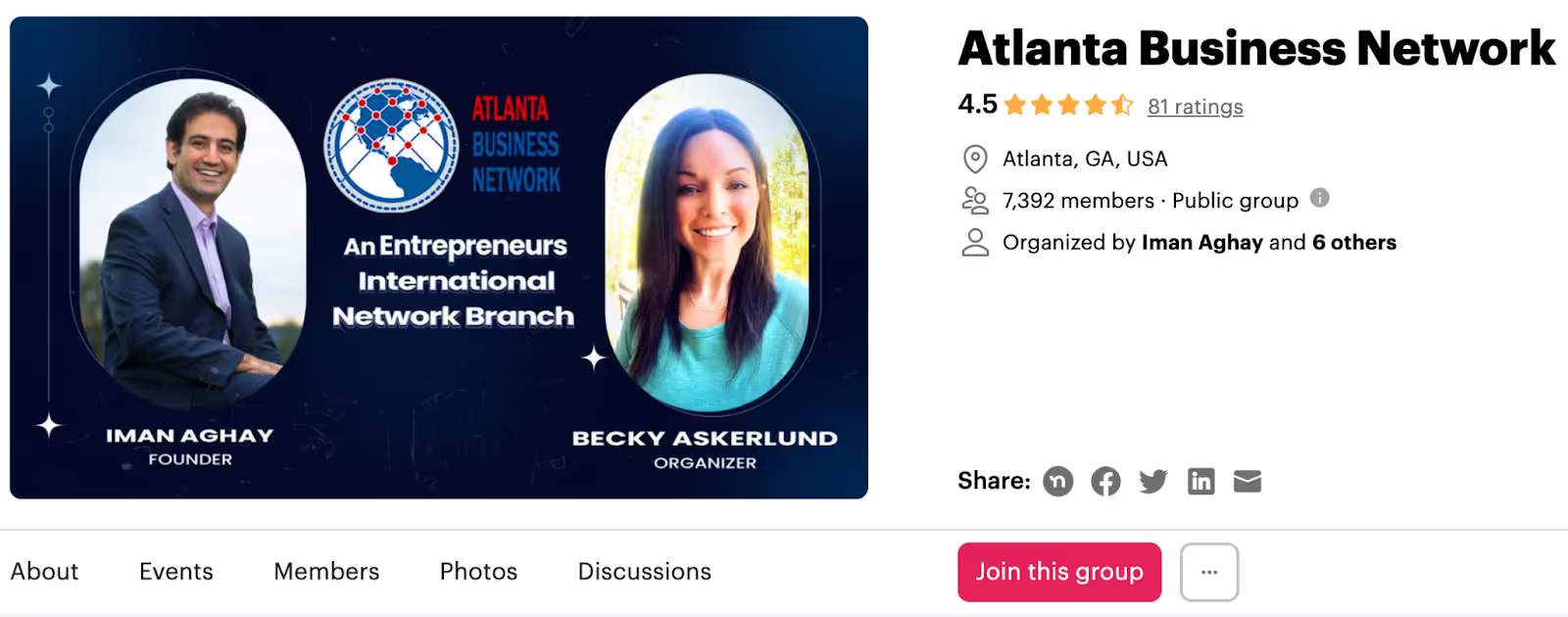
ABN works best for service professionals who rely on referrals. Think real estate agents, insurance brokers, financial advisors, and home service providers. The group limits membership to one person per profession in each chapter, so you won't compete with others in your field.
Membership runs about $500-600 annually, plus breakfast costs. That might sound steep, but active members often see returns within months. The key is showing up consistently and actively looking for referral opportunities for others.
Network Under 40
Despite the name, Network Under 40 welcomes professionals at all career stages who think young. This group takes a different approach than traditional referral organizations. Instead of rigid meeting structures, they host varied events like panel discussions, social hours, and professional development workshops.
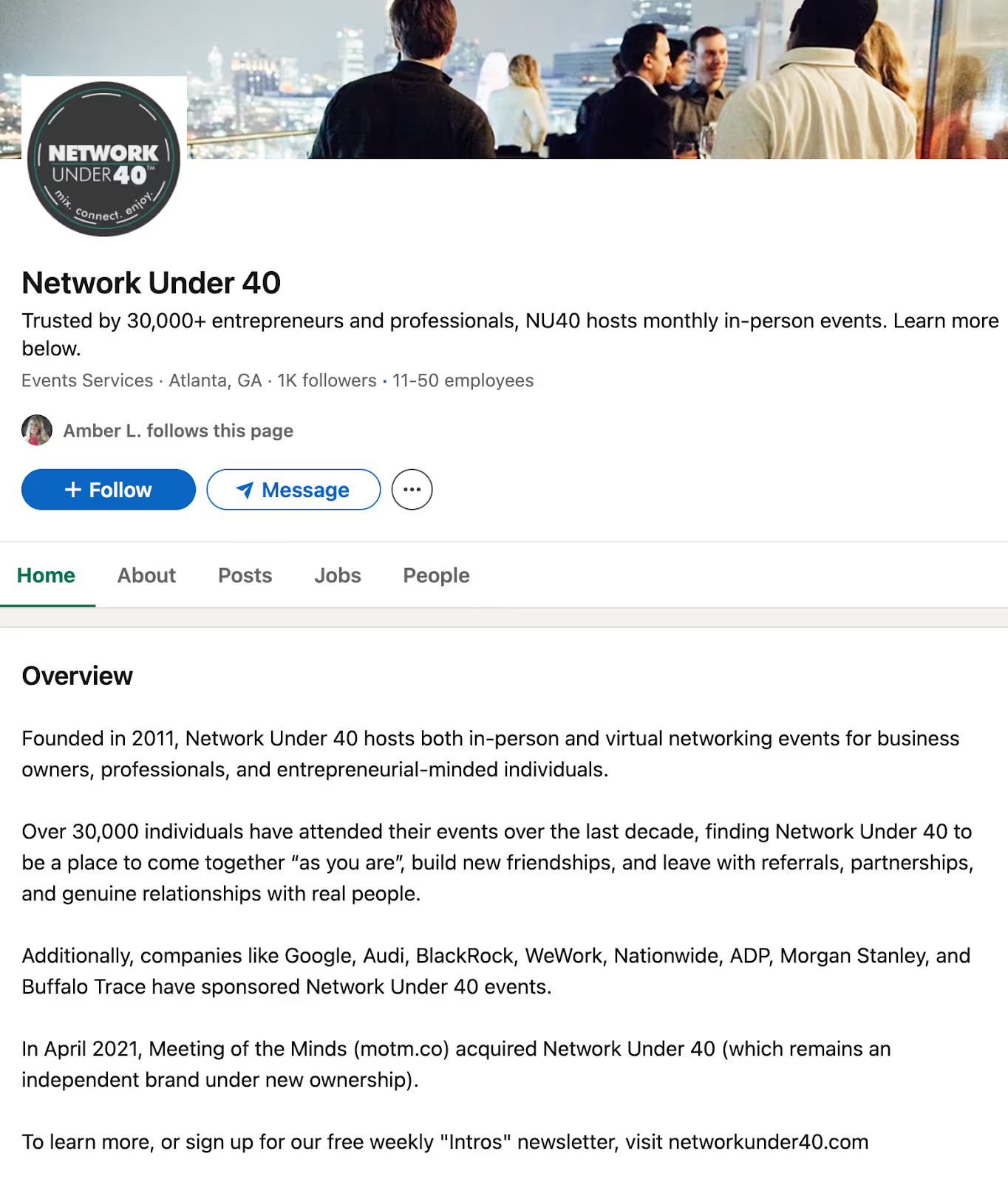
The membership spans industries from tech startups to established law firms. What unites them is ambition and a long-term view of relationship building. Members often collaborate on projects, form strategic partnerships, and even launch businesses together.
Network Under 40 hosts events throughout Atlanta, with regular gatherings in Midtown, Buckhead, and the Perimeter area. Annual membership costs around $200, with individual event fees ranging from free to $40. The lower commitment makes it perfect for busy professionals who can't attend weekly meetings.
BNI Atlanta Chapters
Business Network International (BNI) operates differently than most networking groups. Their philosophy of "Givers Gain" means members must actively pass referrals to stay in good standing. Each chapter meets weekly for 90 minutes, and attendance is mandatory – miss too many meetings and you're out.
This structure creates accountability that many business owners appreciate. BNI reports that their average member generates over $70,000 in referrals annually, though individual results vary widely. The strict format includes timed presentations, referral tracking, and one-on-one meetings between members.
Atlanta has over 30 BNI chapters from Alpharetta to Peachtree City. Investment levels range from $600-800 annually plus weekly meeting fees. Some find the rigid structure stifling, while others thrive with clear expectations. We recommend visiting a chapter twice before committing to ensure the culture fits.
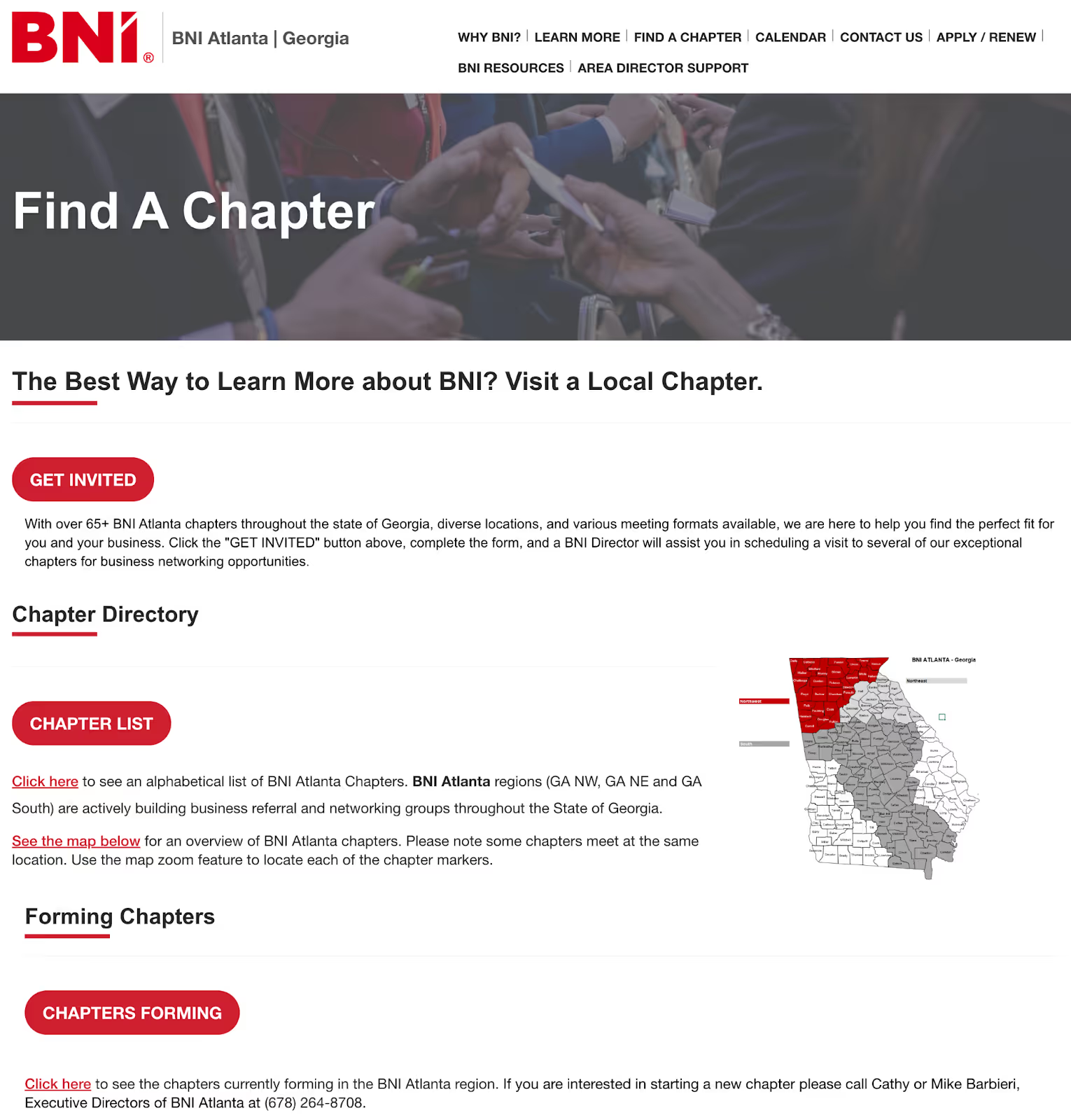
TAG Business
Technology Association of Georgia (TAG) welcomes more than just tech companies. Any business that uses or serves technology – which is basically everyone these days – can benefit from their events. TAG hosts everything from massive conferences to intimate roundtables.
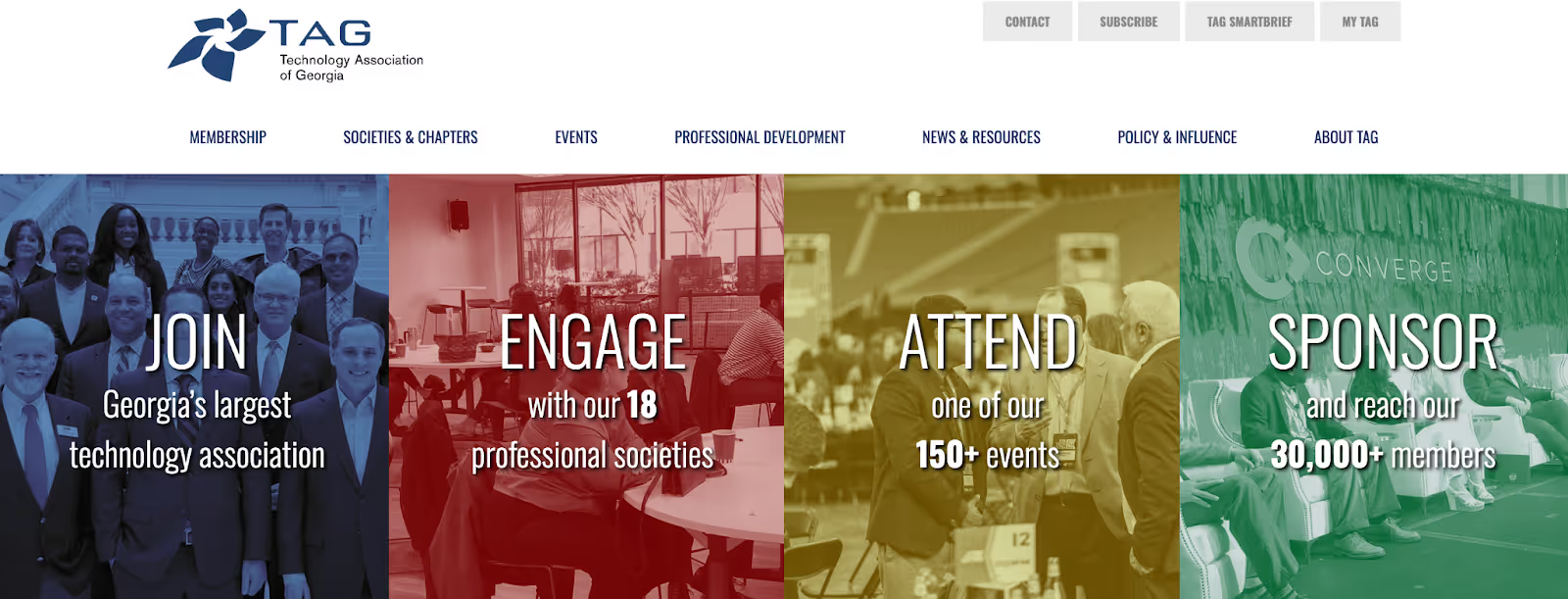
What sets TAG apart is the quality of connections. Members include executives from Atlanta's biggest companies alongside ambitious startups. Conversations tend toward strategic partnerships rather than simple referrals. If you're looking to level up your business thinking, TAG delivers.
Annual membership starts at $350 for small businesses. While pricier than some options, the access to Atlanta's tech leadership makes it worthwhile for B2B companies. Events happen throughout the metro area, with concentrations in Alpharetta's tech corridor and Midtown's innovation district.
Industry-Specific Networking Groups
For Creative Professionals
Atlanta's creative community thrives through several dedicated networking groups:
- AIGA Atlanta: This group brings together designers of all stripes – graphic, UX, interior, and more. Their monthly meetups blend inspiration with practical business discussions. Members share client challenges, pricing strategies, and collaboration opportunities.
- Atlanta Photography Group: This group takes a similar approach for visual artists. Beyond technical workshops, they host business-focused sessions covering contracts, marketing, and client management. Their quarterly portfolio reviews provide valuable feedback in a supportive environment.
- Creative Mornings ATL: This community offers something different: free monthly breakfast lectures featuring creative professionals. While less formal than other groups, these gatherings attract Atlanta's creative elite. Arrive early for the best networking time, as the lectures themselves discourage conversation.
For Tech and Startups
Atlanta’s tech scene offers several networking opportunities tailored to innovation and entrepreneurship, including:
- Startup Grind Atlanta: This community focuses on storytelling and education. Monthly fireside chats feature successful founders sharing unfiltered experiences. The informal Q&A format encourages real conversation about the challenges of building a business. Pre-event mixers provide the actual networking time.
- Atlanta Tech Village: This group has become the unofficial headquarters for startup networking. Their community includes over 300 companies, creating natural collision points for collaboration. Events range from investor pitch sessions to casual Friday happy hours.

For Healthcare Professionals
Healthcare networking in Atlanta goes beyond doctors meeting doctors. Here are several groups to consider as an Atlanta-based healthcare professional:
- HBA: The Atlanta chapter of the Healthcare Businesswomen's Association connects executives, researchers, marketers, and administrators across the industry. Their programs balance professional development with relationship building.
- Georgia Bio: This group serves the life sciences community with events targeting biotech, pharmaceutical, and medical device professionals. Their signature Bio Summit attracts industry leaders from across the Southeast. Monthly meetups offer more intimate networking opportunities.
- HIMSS: The Georgia chapter of the Healthcare Information and Management Systems Society focuses on health information technology. Members include IT leaders from major hospitals, health tech startups, and consulting firms, and educational events always include structured networking time. As Atlanta's health systems modernize, these connections become increasingly valuable.
For Real Estate and Construction
These Atlanta organizations offer strong networking opportunities across the property and building industries:
- Atlanta REIA: The Atlanta Real Estate Investors Alliance brings together everyone touching real estate investments, from house flippers to commercial developers. Members share deals, resources, and hard-won wisdom.
- AGC Georgia: Associated General Contractors of Georgia connects the construction ecosystem, enabling general contractors, subcontractors, and suppliers to build relationships that lead to project partnerships.
- CREW Atlanta: Commercial Real Estate Women Atlanta champions commercial real estate professionals with a focus on advancing women in the industry. Don't let that fool you – men actively participate and benefit from the high-caliber connections.

For Nonprofits
The nonprofit sector in Atlanta has unique networking needs. Here are a few networking organizations for members of nonprofits:
- AFP Atlanta: The Atlanta chapter of the Association of Fundraising Professionals gives development professionals the opportunity to share strategies and stay current with fundraising trends. Monthly luncheons feature successful campaign case studies and donor psychology insights.
- Georgia Center for Nonprofits: This group hosts regular networking events that connect executive directors, board members, and nonprofit professionals. These gatherings often focus on shared challenges like volunteer management, board development, and sustainable funding models.
- Nonprofit Village: Nonprofit Village takes a different approach by clustering nonprofit offices in shared spaces. This creates organic networking as organizations literally work side-by-side.
Small Business Owner Specific Groups
These Atlanta-based resources offer networking tailored to entrepreneurs and small business owners:
- SCORE Atlanta: This group provides free mentorship alongside networking opportunities. Their workshops cover everything from writing business plans to understanding financial statements. The real value comes from connecting with experienced business owners who’ve faced similar challenges.
- SBA Georgia: The Georgia District Office of the Small Business Administration hosts specialized networking events throughout the year. Their government contracting meetups connect small businesses with procurement officers. Access to capital events bring together business owners and lenders in a low-pressure environment.
- Local Co-Working Spaces: Local co-working spaces have emerged as networking hubs for solo entrepreneurs and micro-businesses. Spaces like Atlanta Tech Village, Strongbox West, and Switchyards Downtown Club host member events that feel more like community gatherings than formal networking.

Diversity-Focused Networking Groups
Women's Groups
Atlanta offers several dynamic groups designed to support and connect professional women:
- NAWBO Atlanta: The Atlanta chapter of the National Association of Women Business Owners stands as one of the city’s most influential women’s business organizations. Monthly meetings rotate between educational programs and pure networking events. Members range from solopreneurs to owners of multi-million dollar companies, creating mentorship opportunities alongside peer connections.
- WIT: Women in Technology extends beyond programmers and developers. Marketing professionals, executives, and entrepreneurs in tech-adjacent fields find valuable connections here. Their annual Women of the Year awards gala represents Atlanta's premier networking event for professional women in technology.
- Atlanta Women’s Network: This networking group takes a broader approach, welcoming women from all industries and career stages. Their events tend toward professional development with networking components. Think lunch-and-learns on negotiation skills or leadership development with built-in connection time.
Black Professional Networks
Atlanta hosts vibrant groups that foster connections, mentorship, and community among Black professionals:
- National Black MBA Association Atlanta: This chapter creates powerful connections among Black business professionals. Their events blend professional development with cultural celebration. Monthly mixers attract established executives and rising professionals eager to build meaningful relationships within the community.
- 100 Black Men of Atlanta: This group extends beyond networking to mentorship and community service. Their business programs connect established leaders with emerging professionals, and the organization's reputation opens doors and creates instant credibility for members.
- ATL BLK TCH: Atlanta’s Black Tech network addresses the specific challenges of building tech companies as Black entrepreneurs. Members share funding sources, navigate investor relationships, and celebrate wins together. The supportive environment encourages vulnerability about challenges that might not surface in mainstream networking groups.

Hispanic/Latino Groups
Atlanta offers strong networking opportunities for Hispanic and Latino professionals and business owners:
- GHCC: The Georgia Hispanic Chamber of Commerce serves as the central hub for Hispanic business networking in Atlanta. Their events conducted in both English and Spanish create welcoming environments for all comfort levels. Monthly breakfast meetings feature successful Hispanic business owners sharing their journeys.
- Latin American Association: Atlanta-based Latin American Association’s business programs go beyond traditional networking. They offer business plan competitions, entrepreneurship training, and connection events. The organization’s deep community roots mean networking extends into genuine community building.
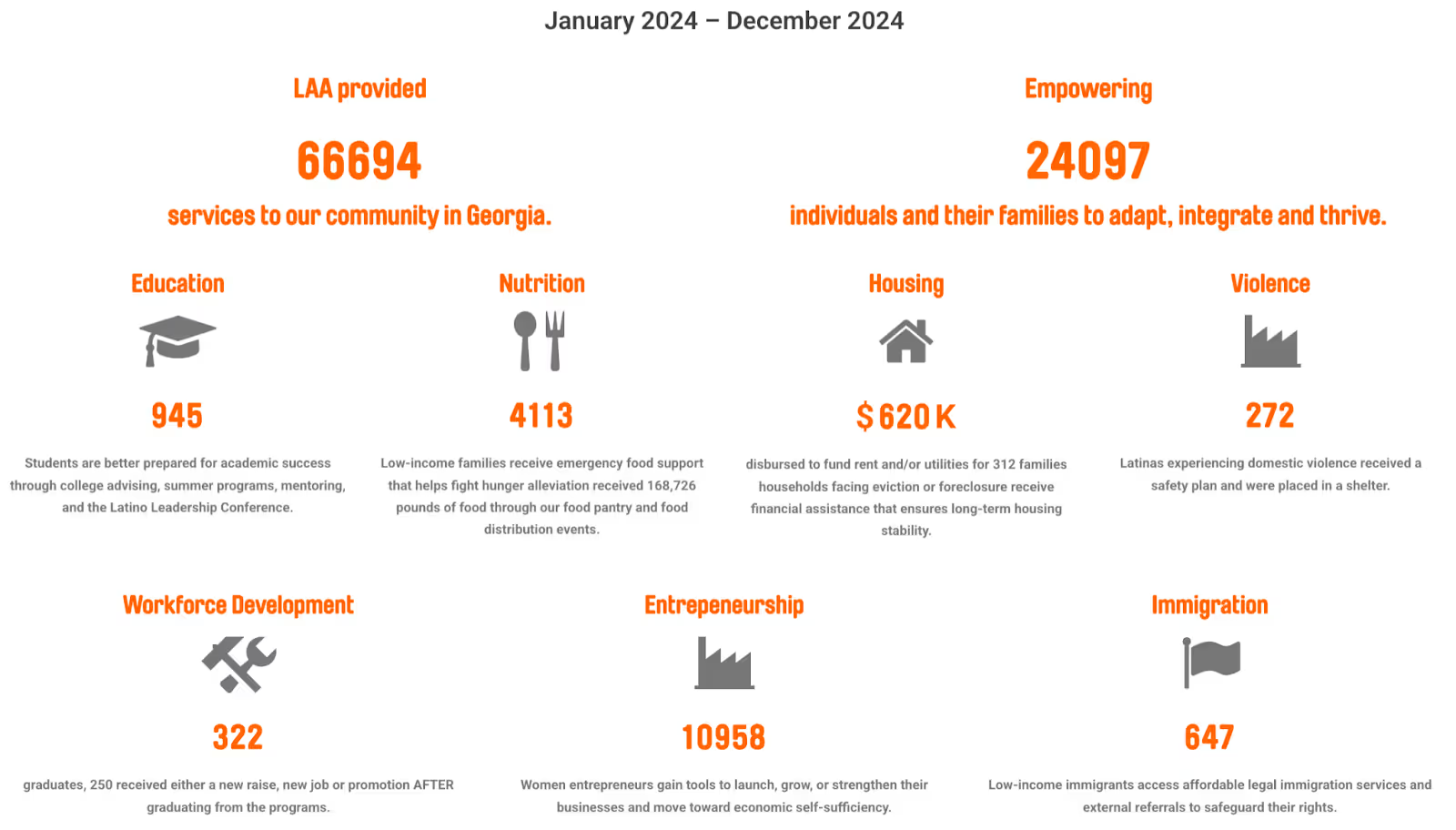
LGBTQ+ Business Networks
Atlanta supports vibrant networks that empower LGBTQ+ business owners and professionals, including:
- Georgia Prospers: Previously known as the Georgia Prospers Business Alliance, Georgia Prospers champions LGBTQ+ owned businesses throughout the state. Their Atlanta chapter hosts monthly networking events in welcoming venues across the city. The certified LGBT Business Enterprise designation opens doors to corporate supplier diversity programs.
- OUT Georgia Business Alliance: This alliance takes a more casual approach with happy hours and social events that encourage authentic connections. Members appreciate the ability to network without hiding aspects of their identity. Business referrals flow naturally from genuine friendships formed within the group.
Neighborhood and Local Groups
By Area
These associations help professionals build local connections across Atlanta’s distinct neighborhoods:
- Buckhead Business Association: This association represents Atlanta’s premier business district with corresponding high-powered networking. Monthly Power Lunches attract C-suite executives and established business owners, and the annual meeting brings together Atlanta’s business elite for an evening of strategic connections. Membership requires significant investment but provides access to decision-makers.
- Midtown Alliance: This alliance focuses on businesses within Atlanta’s densest commercial district. Their networking events often incorporate walking tours, public space activations, or cultural institution partnerships. This creative approach attracts innovative businesses and nonprofit organizations centered in the neighborhood.
- East Atlanta Village Business Association: This association maintains the neighborhood’s creative, independent spirit. Networking happens at local restaurants and bars, supporting member businesses while building connections. The informal atmosphere attracts creative professionals, small retailers, and service providers who value authentic community over corporate polish.
- Decatur Business Association: The Decatur Business Association balances Decatur’s small-town feel with serious business development. Their monthly coffees encourage intimate conversations among local business owners. The annual Decatur Wine Festival showcases member businesses while creating natural networking opportunities.
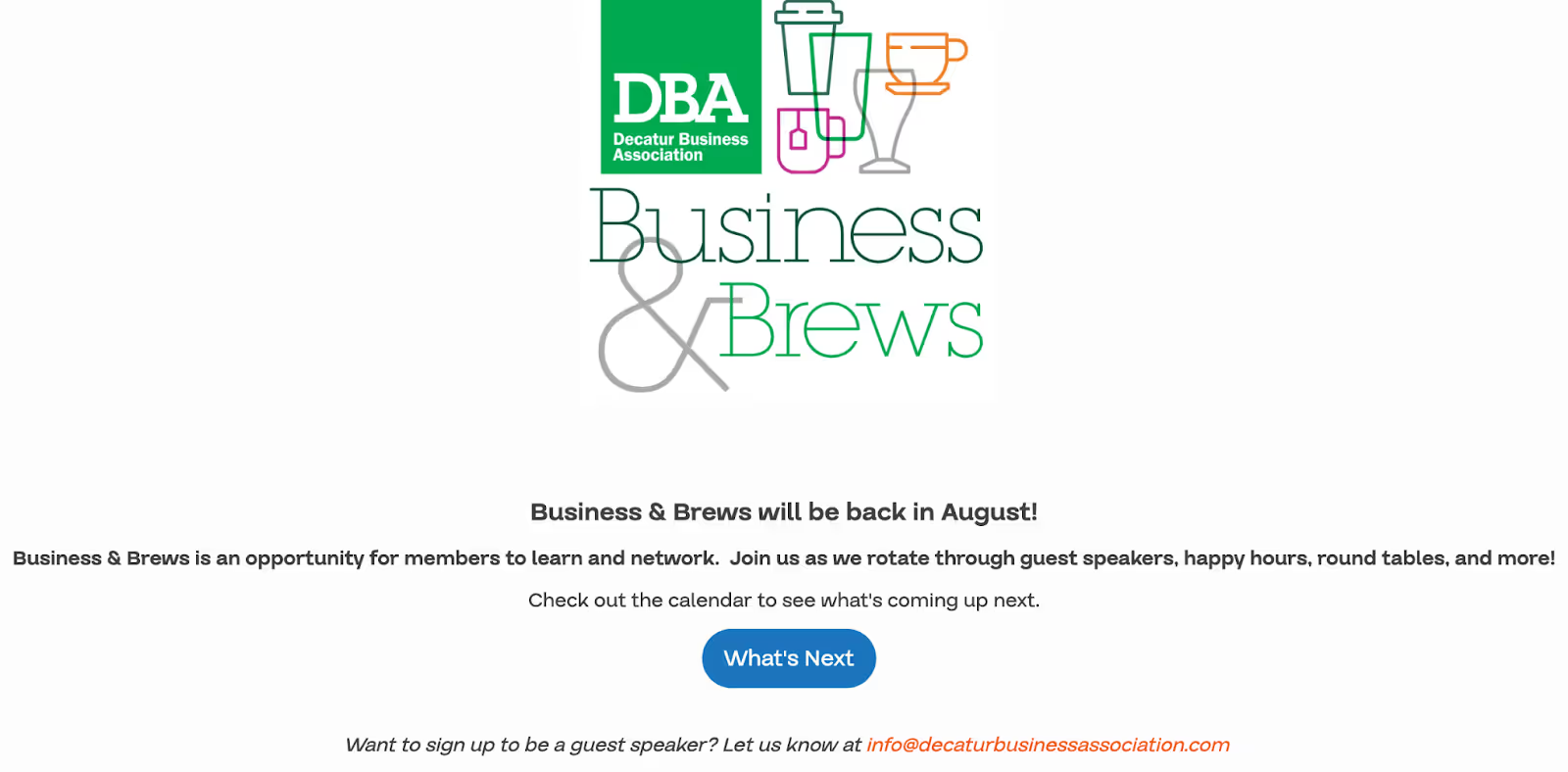
Chamber of Commerce Options
The Chamber of Commerce offers structured networking opportunities across business sizes and geographic areas:
- Metro Atlanta Chamber: This organization operates at a different scale than neighborhood groups. Their events attract Fortune 500 executives alongside small business owners, while regional business councils within the chamber offer more focused networking by geographic area. The investment level reflects the access to Atlanta’s top business leadership.
- Individual City Chambers: Individual city chambers throughout metro Atlanta provide more accessible alternatives. Sandy Springs Perimeter Chamber, Cobb Chamber, and Gwinnett Chamber each host regular networking events tailored to their business communities. These chambers often collaborate with economic development authorities, providing insights into regional growth opportunities.
Value Depends on Fit
The value proposition varies by business type and growth stage. Established companies seeking government relations, support, and economic development intelligence benefit most from chamber membership. Smaller businesses might find better immediate networking value in more focused groups, though chamber events provide exposure to larger potential clients.
Happy Hour and Casual Networking Events
Regular Happy Hour Series
Atlanta's informal networking scene thrives through regular happy hour series like:
- Tech Happy Hour: Tech Happy Hour at Atlanta Tech Village draws developers, designers, and startup founders every Friday. The unstructured format encourages genuine conversations over craft beer and casual bites. Connections made here often evolve into co-founder relationships or first hires.
- Creative Loafing Events: Creative Loafing hosts quarterly networking events that blend Atlanta’s creative and business communities. These gatherings attract an eclectic mix of artists, musicians, marketers, and entrepreneurs. The unexpected connections often prove most valuable – like the accountant who met a musician client needing business management.
- Industry-Specific Meetups: Industry-specific happy hours pop up regularly through Meetup and Facebook groups. Digital marketers gather monthly at rotating Midtown locations. Commercial real estate professionals claim regular spots at Buckhead bars. These informal gatherings lack structure but make up for it in authenticity.
Why Casual Networking Works
Informal events create a more comfortable, human-centered way to build professional relationships. Here are a few reasons why casual networking works:
- Pressure-Free Atmosphere: The relaxed atmosphere of happy hour networking removes pressure and pretense. Without name tags and elevator pitches, professionals connect as humans first. Conversations flow naturally from weekend plans to business challenges, creating deeper connections than formal exchanges allow.
- Introvert-Friendly Settings: Introverts often thrive in casual networking settings. The ability to join small conversation clusters or have one-on-one discussions at the bar reduces overwhelming stimulation. There’s no spotlight moment or mandatory introduction circle – just organic conversation.
- Low-Cost Accessibility: Free or low-cost entry removes financial barriers. Buying your own drinks keeps costs predictable and allows graceful early exits if needed. This accessibility attracts diverse crowds and fresh perspectives often missing from paid membership organizations.
Finding the Right Casual Events
To get the most from informal networking, choose events that fit your style, schedule, and goals.
- Align With Your Crowd: Match the event vibe to your personality and goals. Young professional happy hours skew toward twenty-somethings building careers. Industry-specific gatherings attract seasoned professionals discussing market trends. Creative community events welcome unconventional thinkers and collaborative spirits.
- Consider Timing and Location: These matter more for casual events. Midtown happy hours draw different crowds than Alpharetta gatherings. Friday events attract those ready to unwind, while Tuesday gatherings maintain more professional focus. Test different options to find your sweet spot.
- Look for Light Structure: Some casual events add light structure to improve outcomes. Speed networking rounds, icebreaker questions, or industry trivia create conversation starters without killing the casual vibe. These hybrid formats offer the best of both worlds for those wanting some guidance without rigid agendas.
Virtual and Hybrid Options
Groups That Went Hybrid Successfully
The pandemic forced networking evolution, and some groups emerged stronger. These organizations adapted to pandemic-era challenges by blending virtual and in-person formats effectively:
- TAG: The Technology Association of Georgia mastered hybrid events by investing in quality streaming technology and interactive platforms. Virtual attendees participate in real-time polls, Q&A sessions, and breakout discussions. The technology investment paid off – attendance actually increased as geographic barriers disappeared.
- NAWBO Atlanta: The Atlanta chapter of the National Association of Women Business Owners discovered that virtual lunch-and-learns attracted busy professionals who couldn't commit to in-person evening events. They now alternate between formats, maximizing reach while maintaining personal connections. The key was keeping virtual events shorter and more focused than in-person gatherings.
- BNI Chapters: Several Business Network International chapters split the difference with alternating schedules. Members meet in-person twice monthly and virtually twice monthly. This reduces commute burden while maintaining face-to-face relationship building. The hybrid model particularly benefits members from Atlanta’s sprawling suburbs.
Online-Only Atlanta Groups
These digital-first communities offer meaningful ways to connect without leaving your desk:
- LinkedIn Local ATL: This Atlanta-based LinkedIn group translates the LinkedIn experience into real connections. Monthly virtual meetups follow themes like "Atlanta Entrepreneurs" or "Women in Leadership." Participants update profiles together, share connection strategies, and practice personal branding. The online format allows screen sharing for real-time profile feedback.

- Slack: Slack communities for Atlanta professionals provide ongoing networking between formal events. Tech404 is one popular community that connects Atlanta-based designers and developers through channels organized by programming language, career stage, and interests.
- Virtual Meetups: Virtual meetups through platforms like Airmeet and Remo recreate networking room dynamics online.
How to Find Upcoming Networking Events
Event Discovery Platforms
These tools make it easier to find and filter Atlanta networking events that match your goals:
- Eventbrite: Eventbrite’s Atlanta business category updates daily with networking opportunities. Filter by date, location, and price to find relevant events. The platform’s recommendation algorithm improves as you attend more events, surfacing similar opportunities. Many groups post exclusive member events publicly on Eventbrite to attract new members.
- Meetup.com: This site remains the go-to platform for professional groups in Atlanta. Search by interest area and location to find established groups with regular events. Pay attention to member counts and recent activity – active groups show consistent recent meetups. RSVP lists help gauge whether your target audience attends.
- LinkedIn Events: LinkedIn Events feature connects your professional network with networking opportunities. See which connections plan to attend events, making initial conversations easier. The platform increasingly hosts virtual events directly, eliminating the need for separate streaming tools.
- Atlanta Business Chronicle: This online journal maintains the city’s most comprehensive business events calendar. Their weekly newsletter highlights can’t-miss networking opportunities. Paid subscribers gain access to exclusive Chronicle events featuring Atlanta’s business newsmakers.
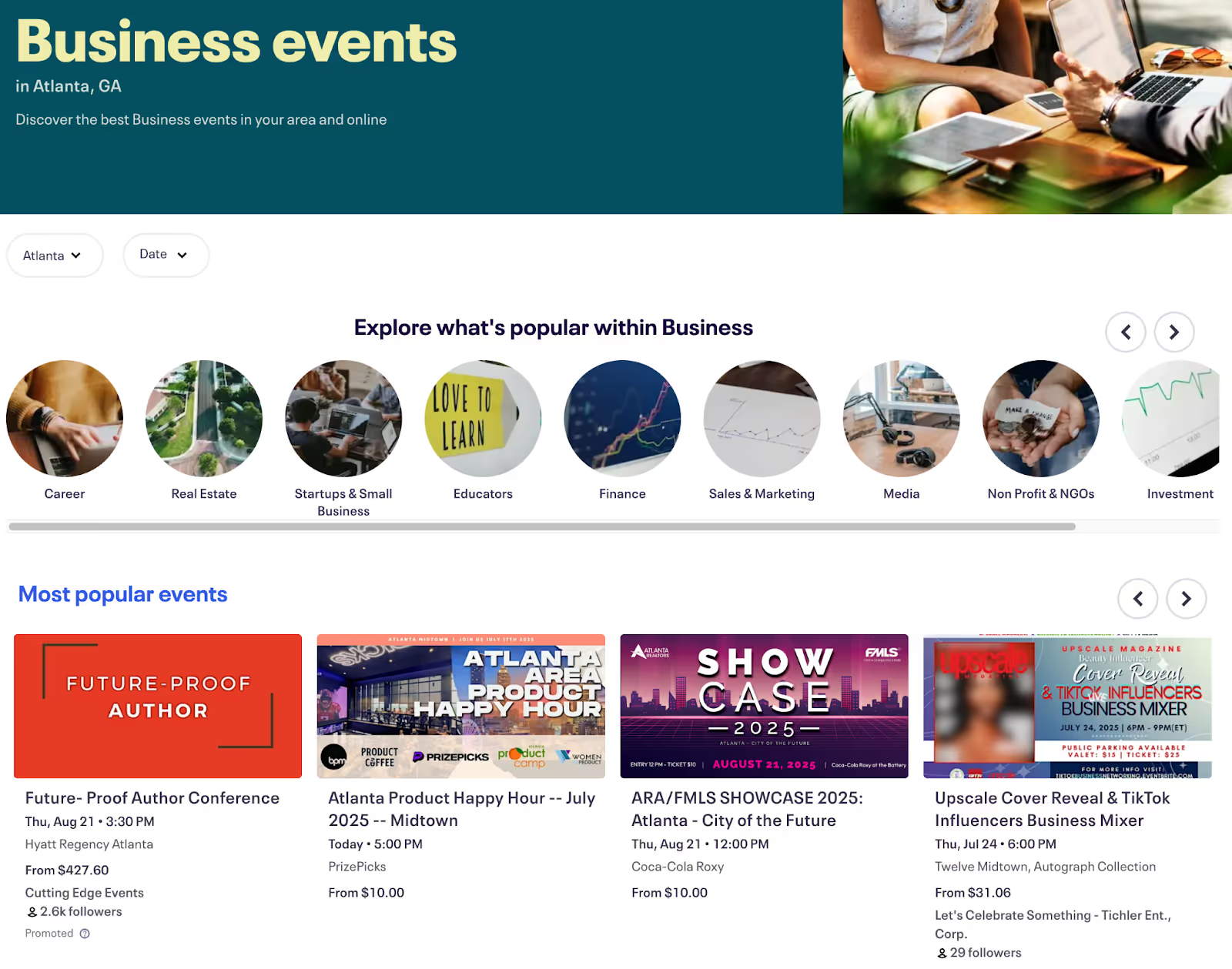
Staying Informed
Smart networking requires consistent awareness. These tools and habits will help you stay on top of the best opportunities:
- Curate Newsletters: Build a newsletter portfolio from key organizations. Sign up for updates from groups that interest you – even before joining. This helps track event patterns and special gatherings worth attending. Create a dedicated email address to manage networking communications separately from daily business.
- Use Social Media Strategically: Social media following requires strategic choices. LinkedIn and Facebook work best for formal business groups. Instagram captures creative networking events through stories and posts. X lists help track multiple organizations without cluttering your main feed.
- Create a Networking Calendar: Creating a calendar prevents overcommitment and ensures consistent activity. Block time monthly for networking activities. Track which events generate valuable connections to inform future choices. Balance formal meetings with casual gatherings for comprehensive relationship building.
How to Choose the Right Groups for You
Define Your Goals First
Clarifying your objectives and style helps you choose the right groups and events.
- Define Your Purpose: Before joining any group, clarify what you want to achieve. Referral-based businesses like real estate or financial services need different groups than B2B companies seeking strategic partnerships. A nonprofit executive building donor relationships requires different connections than a startup founder seeking advisors and talent.
- Assess Your Availability: Consider your available time realistically. Weekly breakfast meetings work for early risers with flexible schedules. Monthly evening events suit those with family commitments. Quarterly conferences fit busy executives who network strategically rather than frequently. There’s no shame in starting small and expanding as you see results.
- Know Your Style: Your personality and networking style matter too. Extroverts might thrive in large mixer events while introverts prefer structured small group discussions. Some professionals excel at working the room while others build deep relationships slowly. Choose groups that play to your strengths rather than fighting your nature.
The Test Drive Approach
Visiting networking groups helps ensure the right fit.
- Get Experience Before Committing: Most quality networking groups welcome visitors to experience their culture before becoming a member. Take advantage of guest passes to assess fit. Arrive early to observe how members interact before official proceedings. Do they seem genuinely interested in each other’s success, or are they just collecting contacts?
- Observe Practical Details: During your visit, assess practical details beyond the official program. How organized is leadership? Do meetings start and end on time? Are refreshments provided or expected? These logistics impact your ongoing experience more than you might expect.
- Ask Specific Questions: Ask current members about their experience. How long have they belonged? What tangible benefits have they received? Would they recommend the group to others in your industry? Their answers reveal more than any marketing materials.
Building Strategic Partnerships vs. Just Getting Referrals
Understanding this distinction will help you choose appropriate groups.
- Referral-Focused Groups: These work through volume – members pass leads for immediate business.
- Strategic Partnership Groups: These foster deeper relationships that create ongoing value through collaboration, joint ventures, or resource sharing.
Your business model determines which approach serves you better. A residential realtor needs steady referrals from mortgage brokers, home inspectors, and contractors. A marketing agency benefits more from strategic partnerships with complementary service providers for comprehensive client solutions.
The best networking strategies often combine both approaches. Join one referral-focused group for immediate business generation and one strategic group for long-term growth. This balanced approach provides stability while building future opportunities.
Making the Most of Your Membership
Before the Meeting
Success starts with preparation. Here’s what to do before your first event:
- Update Your Profile: Update your LinkedIn profile before attending events. Ensure your headline clearly explains what you do and who you serve. Recent professional photos and complete profiles build credibility before you ever shake hands.
- Craft a Conversational Pitch: A conversational elevator pitch should invite dialogue rather than serving as a monologue. Instead of listing services, share a brief client success story or current challenge you’re solving. This approach sparks curiosity and follow-up questions.
- Set Specific Goals: Establish goals for each event beyond "meet people." Perhaps you want to connect with potential referral partners, find a specific type of expertise, or learn about industry trends. Clear intentions guide productive conversations.
Profile Inspiration: How Sangram Vajre Makes LinkedIn Work
Sangram Vajre, co-founder of Terminus and a pioneer in the B2B marketing sector, is just one Atlanta-based business professional you should follow on LinkedIn for profile inspiration. Sangram’s “About” section opens with a clear, personal passion – teaching – framing the entire profile with purpose and authenticity. The use of numbered points and emojis breaks up dense text, making complex ideas scannable and engaging. He also blends credibility with humility, showcasing major business wins, bestselling books, and large audiences without arrogance.
For your own profile, consider structuring it around a core theme, using formatting to guide the reader, and tying your achievements to the value you offer others. Most importantly, close with a clear invitation to start a conversation.
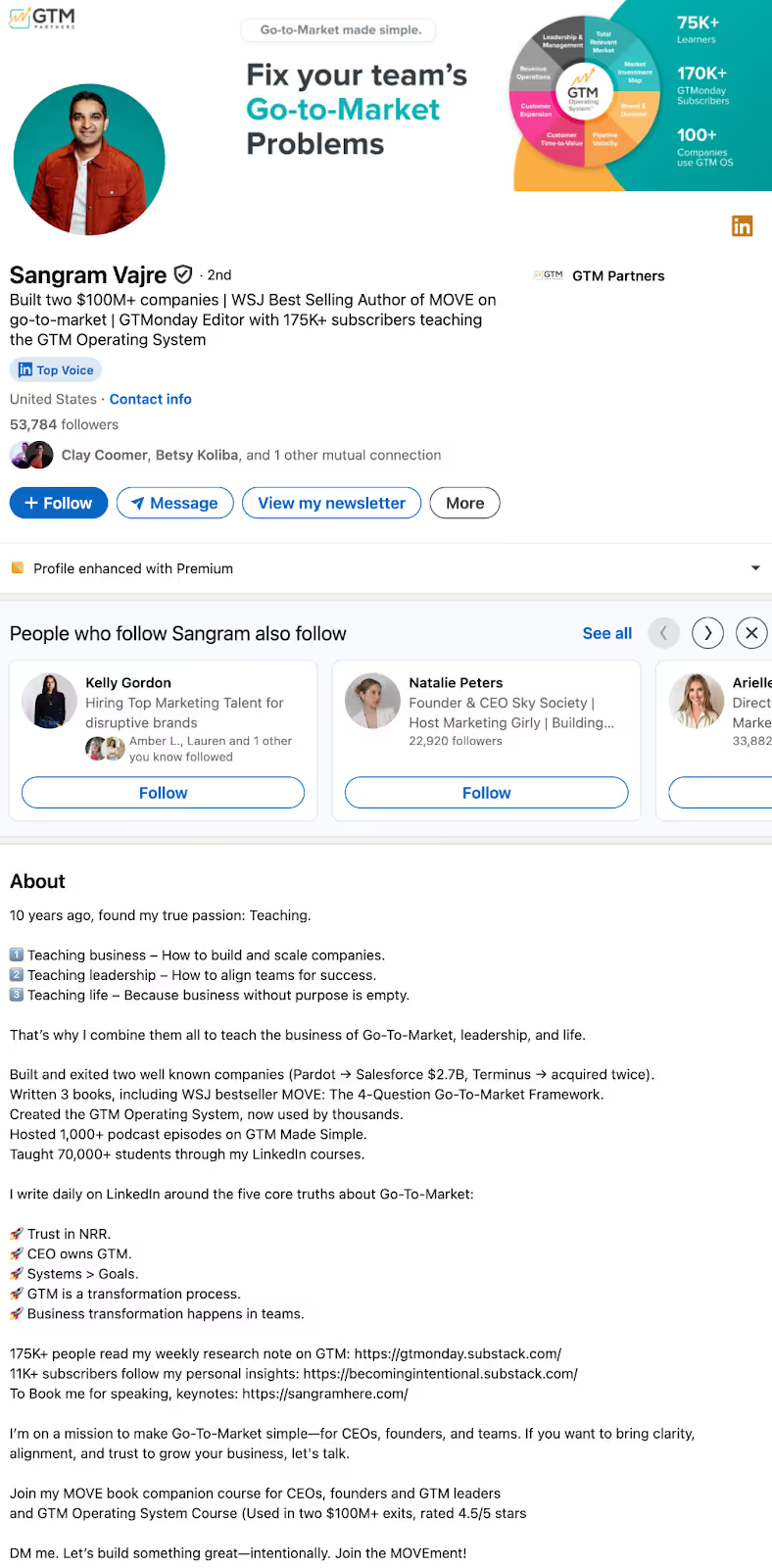
During Events
Focus on quality interactions to make your networking more effective.
- Prioritize Meaningful Conversations: Quality trumps quantity in meaningful networking. Three substantial conversations create more value than twenty business card exchanges. Listen more than you speak. Ask thoughtful questions about others’ businesses and challenges. People remember those who show genuine interest.
- Take Notes: Take notes immediately after conversations. Jot down personal details, business needs, or potential connections you can facilitate. These notes prove invaluable when following up later. Some networkers discretely write notes on business cards received.
- Focus on Genuine Connections: Be a connector, not just a collector. When you meet someone seeking web design services, introduce them to the designer you met last month. These generous actions build your reputation as a valuable network member worth knowing.
After the Event
Timely and thoughtful follow-up turns connections into relationships.
- Follow the 24-Hour Rule: This rule separates professionals from amateurs. Send personalized connection requests or emails referencing your specific conversation within 24 hours of the event. Mention the personal detail they shared or the business challenge you discussed. This attention shows you truly listened.
- Leverage Social Media: Social media connections extend relationships between in-person meetings. LinkedIn works for all professional connections. Twitter suits tech and creative professionals. Instagram fits visual businesses. Choose platforms where your new connections actively engage.
- Schedule One-on-Ones: Request one-on-one meetings with promising connections. Coffee or lunch provides time for deeper business discussions. Virtual meetings work for busy schedules or distant locations. These individual meetings transform networking contacts into business relationships.
Red Flags to Avoid
Be cautious of warning signs that indicate a networking group may not be right for you.
- Trust Your Instincts: Follow your gut when something feels off about a networking group. Multi-level marketing schemes often masquerade as business networking. If members push specific products or recruitment over genuine business connections, run. Legitimate networking focuses on mutual benefit, not upline building.
- Beware of Excessive Fees: Excessive fees without clear value signal problems. While quality networking requires investment, beware of groups charging thousands upfront or requiring expensive training programs. Legitimate groups offer transparent pricing and trial periods. High-pressure sales tactics around membership indicate misplaced priorities.
- Look for Leadership and Structure: Issues with leadership and structure doom networking groups. If the same clique controls everything or meetings lack basic organization, the group won’t serve members well. Inconsistent attendance, especially among leadership, shows lack of commitment. You deserve better than chaotic, poorly run gatherings.
- Avoid Aggressive Sales Culture: Groups that feel like aggressive sales floors miss networking’s purpose. Members should seek mutual benefit, not treat every interaction as a sales opportunity. If you feel pressured to buy from other members or hard-sell your services, find a more professional environment.
Take the Next Steps and Start Building Genuine Connections
Atlanta's networking scene offers something for everyone, from formal referral groups to casual creative gatherings. The key is finding where you fit, not forcing yourself into uncomfortable situations.
Pick one or two groups from this guide that align with your business goals, personality, and available time. Update your LinkedIn profile, prepare your elevator pitch, and attend their next event as a guest. Give yourself permission to try different options before committing. Remember, the best networking group for your competitor might not suit your style or goals.
Commit to giving any group 3-6 months before judging results. Relationships take time to develop. That promising connection from month one might introduce you to your biggest client in month four. Consistency and patience pay dividends in networking.
Remember: building a strong network is like tending a garden – it requires regular attention, patience, and the right environment. Atlanta provides fertile ground for business relationships. Your job is to plant yourself in the right soil and tend those connections carefully. The harvest will come.
So take action today. Show up to a local group ready to build genuine connections. Atlanta's business community is waiting to welcome you.

